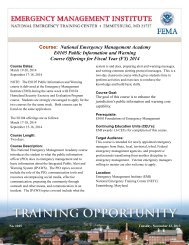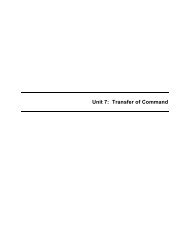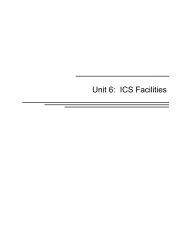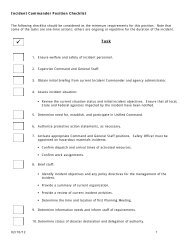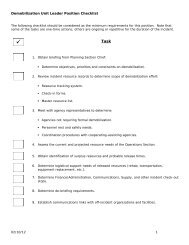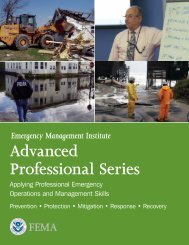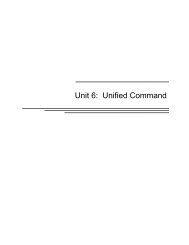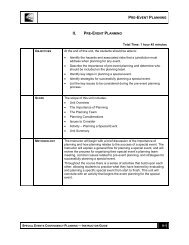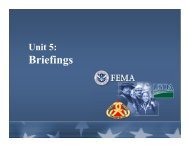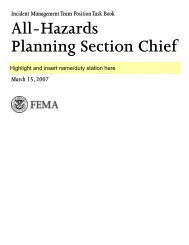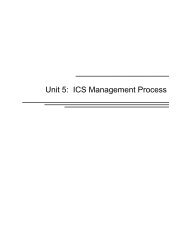EMI Course Catalog - Emergency Management Institute - Federal ...
EMI Course Catalog - Emergency Management Institute - Federal ...
EMI Course Catalog - Emergency Management Institute - Federal ...
You also want an ePaper? Increase the reach of your titles
YUMPU automatically turns print PDFs into web optimized ePapers that Google loves.
STATE/LOCAL/TRIBAL FIELD<br />
COURSES—PREPAREDNESS<br />
EmErgEncy managEmEnt InstItutE • 2011-2012 • catalog of coursEs<br />
Preparedness Curriculum<br />
The <strong>Emergency</strong> <strong>Management</strong> <strong>Institute</strong> (<strong>EMI</strong>) offers<br />
a number of training activities that develop operational<br />
capabilities and facilitate an effective response<br />
when an emergency occurs. Much of this preparedness<br />
training supports the requirements of chief<br />
executives and top-level, appointed emergency<br />
management officials. Public officials are responsible<br />
for protecting the lives and property of their<br />
constituents at all times. Yet, it is the emergency<br />
management professional on whom chief executives<br />
must depend for developing and maintaining<br />
emergency response capabilities on a day-to-day<br />
basis, as well as for providing sound advice and<br />
proper resource support during a period of crisis.<br />
This team relationship is critical for smooth, quick<br />
decision making and coordination during a community<br />
emergency. Preparedness courses provide both<br />
orientation and insight into emergency responsibilities<br />
including the development of emergency plans,<br />
facilities, and appropriate public policies.<br />
<strong>EMI</strong> offers courses that facilitate public policy<br />
formulation, technical skill building, and effective<br />
planning measures at <strong>Federal</strong>, State, local, and Tribal<br />
levels of government. Such courses, seminars, and<br />
workshops address preparedness issues including<br />
continuity of operations, radiological preparedness,<br />
and hazardous materials preparedness.<br />
Some of the training is specific and technical, while<br />
other topics are designed to stimulate proactive<br />
policy-level decision making. The many resident<br />
and non-resident training activities included in<br />
the Preparedness Curriculum provide specialized<br />
training and information needed by <strong>Federal</strong>, State,<br />
local, and Tribal government staffs and selected<br />
representatives from the private sector (business and<br />
industry).<br />
FEdErAL EmErgENCy mANAgEmENT AgENCy 94<br />
<strong>EMI</strong>’s Incident Command System (ICS)<br />
Curriculum<br />
FEMA’s <strong>Emergency</strong> <strong>Management</strong> <strong>Institute</strong>, the United<br />
States Fire Administration’s National Fire Programs<br />
Branch, the National Wildfire Coordinating Group,<br />
and the United States Department of Agriculture<br />
developed common course objectives and content<br />
for the 100 , 200 , 300 , and 400 level ICS courses.<br />
The partner agencies and departments recognize<br />
these courses as equivalent.<br />
ICS-100- and 200-level courses are available in both<br />
a web-based Independent Study format and as a<br />
classroom-delivered course. These entry-level ICS<br />
courses are suitable for persons working in an ICS<br />
environment. ICS-100 and 200 are located on <strong>EMI</strong>’s<br />
Independent Study web site at: www.training.fema.gov.<br />
The 300- and 400-level courses are classroombased<br />
multi-discipline or multi-jurisdiction courses<br />
intended for persons with supervisory responsibilities,<br />
such as the Incident Commander or Planning<br />
Section Chief.<br />
Community Mass Care <strong>Management</strong><br />
(G108)<br />
This 2-day course is intended to equip emergency<br />
management and voluntary agency personnel<br />
with the knowledge and skills to perform as effective<br />
mass care coordinators in a broad range of<br />
disaster situations. The course covers how to assess<br />
and size up mass care needs; how to plan for mass<br />
care; recruitment, training, and exercises for mass<br />
care personnel; and actions to take in short-term<br />
and long-term mass care operations (response and<br />
recovery).<br />
Selection Criteria: State, Tribal, and local government<br />
emergency management and voluntary agency<br />
personnel who provide mass care assistance.



